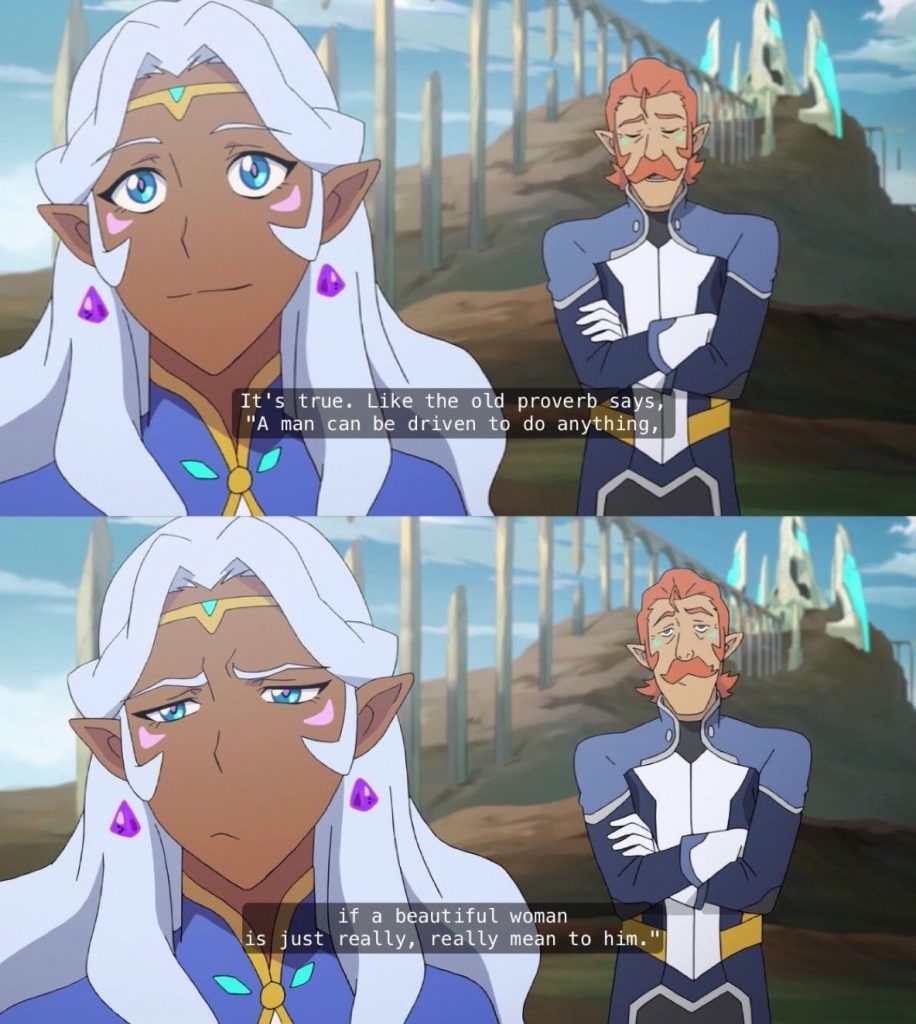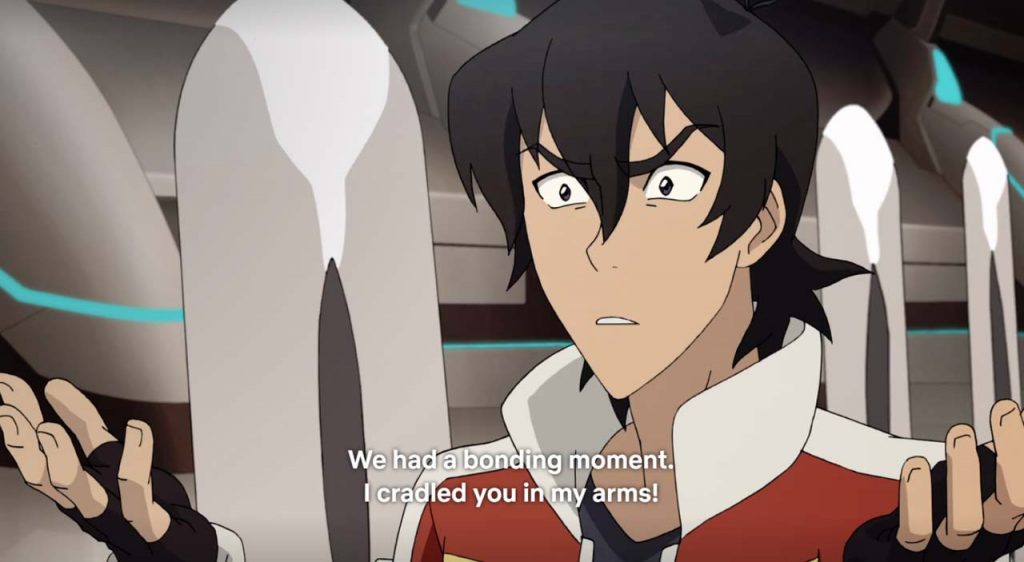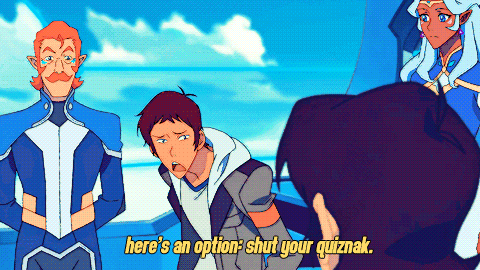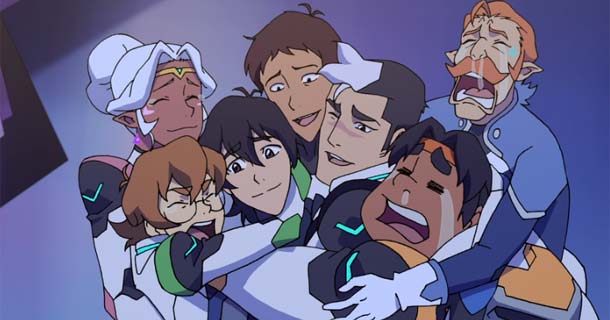A couple of months ago while browsing Netflix with my son, we stumbled on the Dreamworks reboot of Voltron.
6-year-old me was a fan of the original in the 80’s. I remembered little of why, just that I was and desperately wanted a lion figurine (but never got one). With my son’s interest in Transformers (sigh), I figured Voltron might be a great way to diversify his interests in robots that became other robots.
So we started watching Voltron: Legendary Defender.
Part way through the pilot, all I could think was:
My partner is going to wet himself when he sees this.
Because Voltron: Legendary Defender (VLD) didn’t seem to be a cartoon solely created to sell space lion figurines to kids rich and lucky enough to get them. It was a fully-fledged sci-fi/anime with an expansive, very real universe in peril with a depth of character the adult me yearned for. It was funny and sad and exciting. I would watch an episode or two with my son by day, and an episode (or six) a night with my partner. My partner watched it in his lunch breaks at work.
The whole family got something out of it. And we were Hooked. Seven (of eight) seasons were already on Netflix, so we were able to binge for a while.
The quality of the writing, I’ll admit, occasionally ebbed, as happens in a show where there are multiple writers. The characters took turns that seemed a little unexpected, given what had come in previous seasons. But overall, I was happy watching this incredible story unfold and allowed myself to be surprised by where it was taken.
And then the wait for the final season began. I had just spent perhaps six seasons in agony, terrified that my favourite character (Shiro, for anyone playing at home) would be killed, because just give that guy a break already! I needed to know what happened, but what was going to happen wasn’t out in the world yet.
To fill the void that having no new VLD left in me, I did what I’ve always done; I ventured online to find a fandom to discuss it with, which would tide me over.
Spoilers for all 8 seasons ahead, and some swearing.
Holy shit.
Yes there were the beautiful, lovingly-created fanarts/fics and a portion who spread nothing but love. But…the VLD fandom was largely a community at war.
The conflict seemed to focus on (but was certainly not limited to) a few key topics:
- who should romantically be paired with who,
- how dare the writers/creators/Dreamworks do this or that,
- anything post season 2 is despised and if you don’t despise it you don’t really understand it.
Something was wrong; something I had caught a hint of when watching, but not really focussed on until now.
At first I backed away, because who needs a rabid fandom in their lives?
But what I had seen did get my brain ticking; not only over show-related topics, but on why and how this apparent loathing had sparked. How could these people claim to be fans of VLD and spew such hatred for it?
Shouldn’t they simply stop watching?
And then I realised how unfair this was. Logical and intelligent people – extremely articulate and passionate – would not turn on something they loved without due cause.
Eventually, my curiosity got the better of me, and a question formed:
Why do fans inevitably turn on the original content they loved?
Because I wasn’t so close to VLD, I began trying to dig into the issue of why – and I was surprised at how difficult it was to locate reputable sources in the quagmire of arguing voices.
I’m probably wrong, but it seemed the VLD fans turned when the lead writer and story editor, the universally loved Tim Hedrick (Legend of Korra) departed VLD to work on something else.
Grateful to leave the series on a couple of high note episodes. Sadly, like the Castle of Lions, I was crushed by the pressure and never made it back to Earth! I appreciate all the love, Voltron fans. I’ll be watching along with you in Season 8! https://t.co/So0NdnT08v
— Tim Hedrick (@TheTimHedrick) August 11, 2018
Hedrick was somebody who truly loved and understood Voltron, from what I’ve read. He still writes the follow-up comics, and prior to coming up with the initial story arc (Shiro being captured by the Galra), actually watched the original series, because he remembered being a fan when he was a child.
He further believes that the humor of Legendary Defender serves to make things more dramatic and realistic instead of undercutting drama.
(source)
Okay, so yes. I supposed the change I’d noticed in the characters and plot arcs made sense; they’d lost the editor who’d tied all the episodes together. How frustrating.
According to the fandom, and several unverified sources who claimed to work on the show, Hedrick’s departure was ALL to do with the VLD anti-Christs, showrunners Lauren Montgomery and Joaquim Dos Santos, their agenda, and the toxic work environment they manufactured around the VLD team.

Now I knew to look for it, I could easily find utter hatred spewing onto the net for these two key figures. Apparently they were constantly butting heads with Hedrick and the other writers. Apparently they wanted Keith and his journey to be the focus, where the initial series set up differently, on all the characters but with Shiro, undeniably, leading the way. Apparently Shiro taking the lead incensed Montgomery and Dos Santos so much that they orchestrated Shiro’s death with the intention he never come back.
The problems are much, much more complicated than this, but I’ll focus on the above for the sake of clarity in my rambling post, otherwise we’ll be here all day. No matter how I searched, I could find no official sources for this information (please enlighten me if you do!) – but this is widely accepted as Truth.
Within the fandom, online petitions began calling for Dreamworks to fire Montgomery and Dos Santos.
I’ll admit I was fascinated, watching from the outside. I loved VLD, but when I started really thinking about all the fandom proposed – I found I somewhat agreed with them. On a character development front, I wondered if we had been robbed of What Could Have Been.
Then the series ended.
I didn’t mind it. I dunno. I felt a little deadened by the intensity of the fandom. Now that I knew to look for these strange character decisions and plot swings, I noticed them – they were very obvious. I started wondering why ABC had happened in season # if they were only going to do XYZ.
On the whole, it was fine, I guess. I felt flattened; I felt little, to be honest. VLD no longer shone; I now wished for something more; arcs that had never eventuated and plots that had never been resolved; for there to be more meaning in countless interactions and more justice for the protagonists and growth for the antagonists.
Cringing at what I’d find, but unable to stay away because I did want more, I hopped online.
Predictably, the fandom HATED it with the fire and fury of a thousand suns.
Rumours started flying that Montgomery and Dos Santos has been fired by Dreamworks (untrue).
More petitions turned up, begging Dreamworks to allow Hedricks to write the show that HE envisaged. The Proper VLD.
What’s the Proper VLD?
But of course; one that allowed the characters to continue to develop in the way they had been started, before Hedrick’s decisions were overwritten by the anti-Christs. It makes sense when you put it like that; why orchestrate a fabulous, complex story with nuanced characters, only to end it by flattening or not even acknowledging that setup?
What was the point?
More rumours flew. Hedrick had planned a Keith/Lance relationship; the LGBT+ representation that had been teased. Hedrick had planned a Shiro/Allura endgame; that’s why they were basically space mum and dad to the Paladins.
Hedrick had meant for every fan’s theories and dreams to happen. If only Hedrick had been able to remain on the show, it would have worked. If only Montgomery and Dos Santos hadn’t been horrible people and pushed him away, the fans could have watched the VLD they deserved.
Some of the anger revolved around ships (“relationships”), but ultimately, the fandom was furious about the direction the characters and story had been taken. They were furious that the show they loved now made them sick.
Some even refused to watch the final season for reasons of self-care, once they heard how it would end.
Look I know I’m painting a pretty bleak picture of fandom here. I don’t agree with attacking anyone for any reason online, particularly content creators.
But behind the backlash – this hatred for something that was once a source of such hope and fun? I could kinda see where they were coming from – even if I didn’t feel this pain as keenly as other fans did.
And I began to wonder – the entire point of this post:
Is it possible, if you immerse yourself in someone else’s creation, to be satisfied with its ending?
I think not, and it’s both nobody’s and everybody’s fault.
When I watched seasons 1-7 with no idea of the fandom in mourning, I was okay with it. Sure, there were things I’d have done differently, but I didn’t write the show. That wasn’t for me to decide.
But somehow, if we immerse ourselves in a fictional world, we start to believe we are entitled to more than we are given.

And if we are captured by a show – be it an arc or character/s that resonates – we don’t want their story to end. They are like family. The very thought of an ending – of no more content to look forward to – makes you feel physically ill.
The ending comes, because all stories end. And you realise there won’t be answers to the burning questions you had. You realise that the character’s paths are now set; all those imaginings and theories speculated during the wait for new content are either irrelevant or impossible to imagine any more because of what came to pass.
It’s over. And you’re sad.
You reach out to others who are feeling what you feel. And together, you get mad.
“Why did they bother doing this…!?”
“How dare the creator/s…?!”
“But what happens to…?!”
Questions that will never be answered; eventualities that you believed were certainties, that will never come to fruition.
I believe there is a link between the level of immersion, and enjoyment of an ending one has on a piece of content. And when I got thinking about it – I could not think of a single show I have been immersed in, that I felt entirely satisfied with its finale.
Why do we feel we have the right to be angry about someone else’s choices?
Because we lived and breathed those choices, for a time. We knew the characters, we understood the background, and we picked up on the hints and clues littered throughout their adventures – with others who also lived and breathed it. It brought a sense of belonging, camaraderie, and hope. We loved that we were smart enough to have seen ABC in series X; were certain all the pieces of this fantastic puzzle would fall into place JUST SO because it was beautiful and poignant and perfect for a huge (documented and peer reviewed) list of reasons.
And then you’re faced with the reality that not only it will never happen, but that you were wrong. Or that it didn’t matter.
The deeper you are involved in a series, the less likely you are able to enjoy the ending.
Because deep involvement somehow equals a sense of ownership. That by being so enmeshed in a world, you have a claim on it. And it hurts, bitterly, when you’re wrenched away from that.
Is there a solution?
How the quiznak are content creators expected to remain true to their story if they’re facing impossible odds? That no matter what they do, it will disappoint those who were their most avid supporters?
And how can we risk immersing ourselves in worlds knowing that the deeper we get, at some point, we will believe we know better than the creators – and that to watch the rest unfold will tear out our soul?
Content we love immensely seems to be doomed to destroy us.

So what. Should we stop caring about it so much? Impossible. Should content creators change their story based on what fans believe will happen? How is that fair? How can they make everyone happy where there are opposing views on what should happen? How does that help them to grow and be confident in their creations – to keep creating – when everything they present is second-guessed?
Does anyone out there have any solutions?

Can you think of a single series that you’ve been more than fleetingly involved with, that you’ve been entirely satisfied with?
Because I’m still trying to figure this one out.

I relate to the frustration of immersing yourself in a series only to be disappointed by the ending. It’s hard not to feel a sense of ownership when you invest so much time and emotion into something. Maybe the key is to appreciate the journey and not get too hung up on the destination.
Ok, this article captures the rollercoaster ride that is being part of a fandom. It’s like we become so invested in these characters and stories that we feel entitled to dictate their paths. But can we really blame ourselves? We’re just passionate fans who want the best for the content we love.
Yeap! Being part of a fandom is a rollercoaster of emotions. We become so invested in these characters and stories that it’s only natural to feel a sense of ownership and a desire for the best possible outcomes that align with our personal feelings about the project. Our passion as fans is a testament to the impact these creations have on us.
While it’s important to remember that content creators have their own creative vision, it can sometimes be challenging when their choices don’t align with our expectations. However, rather than dictating their paths, perhaps we can embrace the diversity of interpretations within the fandom and engage in open, respectful discussions with fellow fans and even the creators themselves. It’s through these conversations that we can appreciate different viewpoints and share our love for the content.
Ultimately, it’s the combination of the creators’ vision and our unwavering support as fans that makes being part of a fandom such a special and rewarding experience. We just gotta be a little nicer/kinder about everyone having different thought patterns though, right?
It’s intriguing to observe the dynamic between creators and fans within a fandom, remember what happened with ATLA? While fans invest their hearts and minds into a series, their expectations and desires may not always align with the creators’ intentions. This disconnect can lead to tensions and disagreements, like in Ember Island Players where the creators openly mocked and alienated a huge sector of their fandom.
It raises the question of whether creators should heed every fan’s opinion or suggestion. While feedback and engagement can be valuable, it’s crucial to strike a delicate balance. If creators feel disrespected or invalidated by a section of the fandom, it may hinder their creative process and dampen their enthusiasm for storytelling, or turn them into whatever happened in ATLA.
Creators do have the right to explore their ideas without feeling obligated to conform to fan expectations that may contradict their own vision. While it’s essential for creators to respect and appreciate their fans, it’s equally important for fans to respect the creative choices and directions taken by the creators.
Ultimately, finding a balance between creator autonomy and fan engagement is a delicate endeavour. Both parties play a significant role in shaping the fandom experience, and fostering a respectful and collaborative relationship can contribute to a more fulfilling journey for everyone involved, it’s just a question of how when everyone is so wrapped up in a thing, emotionally.
So, this raises a the point about the ownership of creative works once they are released into the world. While creators have the right to hold tightly to their vision for a show, there comes a point where the art takes on a life of its own and becomes subject to interpretation and adaptation by the audience. Once a piece of art is out there, it no longer solely belongs to the creator; it becomes a shared experience. People engage with it, form connections, and may even reinterpret it in ways that resonate with them personally. It’s a beautiful aspect of art that it can be reimagined and reinvented by others.
However, finding a balance between the creator’s vision and the audience’s expectations can be challenging. While creators should remain true to their artistic integrity, it can also be valuable to listen to the feedback and ideas of the audience. Ultimately, the relationship between creator and audience is a delicate dance, where both parties contribute to the ongoing evolution of the art. It’s a reminder that once art is released, it becomes a collaborative experience, shaped by the collective imagination of those who engage with it.
And therein lies a problem with the format, really. When creators embark on the journey of making something, they invest their time, energy, creativity into bringing their vision to life. They go through the process of writing, recording, and producing each episode, and by the time it’s released, they have reached a point where the story has an end and is ready to be shared with the world. The serialised nature of releasing episodes gradually can present a unique challenge. As fans speculate, theorise, and connect the dots between different elements, the creators might come across these and ideas and think, ‘Oh shit, why didn’t we think of that?’
By the time these realisations happen, it’s often too late. The episodes are already written, recorded, and produced, making it challenging to incorporate those newfound insights or tie up loose ends in a way that satisfies everyone. Sometimes, being too close to your own work can prevent you from seeing all the possible connections or unintended loose ends that emerge through audience engagement.